Patient therapy compliance with medication therapy management

Did you know that 20 to 30% of new prescriptions are never filled in the pharmacy, and further, 50% of people do not take medicines as prescribed.
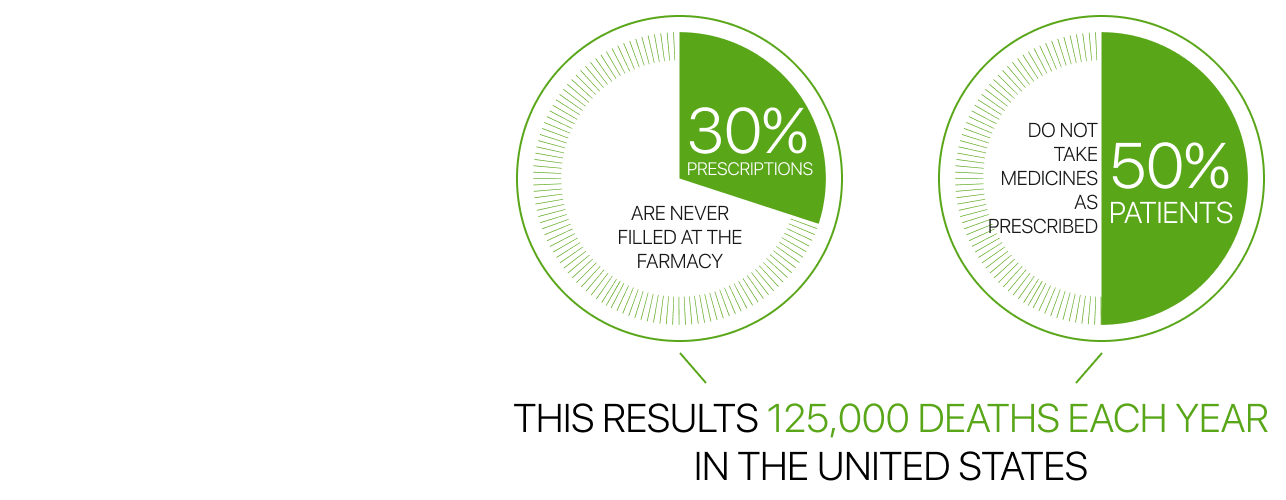
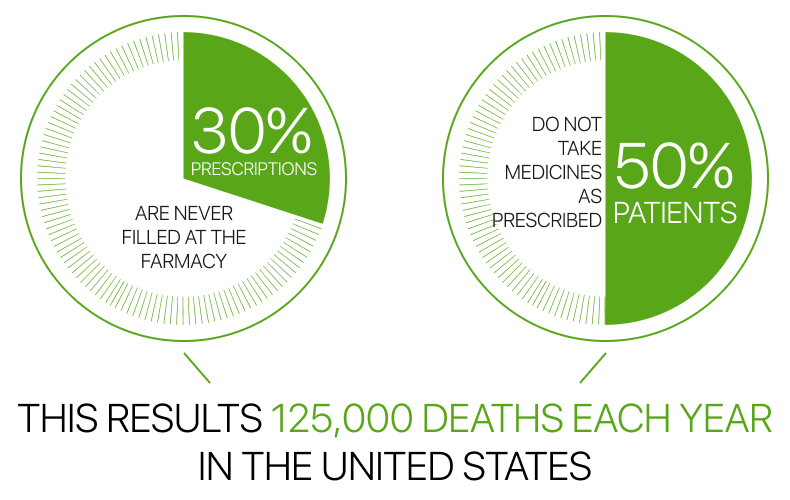
According to the Centers for Disease Control and Prevention, an inefficiency in the treatment of chronic diseases is that up to 50% of people do not adhere to the correct treatment regimen and this results 125,000 deaths each year in the United States.
As we have already mentioned, this result is due to noncompliance with medications as prescribed, not following clear instructions from the doctor, and most people after a certain period of time may stop taking medications altogether.
The numbers are staggering, so we will take a closer look at this problem and how Mega Aid Compounding Pharmacy effectively addresses noncompliance with its own in-house medication therapy management program.
Why Some Don’t Take Medications as Prescribed
Many patients do not follow healthcare provider instructions on how to take medications for various reasons. Such as, not understanding the directions, forgetfulness, multiple medications with different regimens, unpleasant side effects or the medication doesn’t seem to be working. Cost can also be a factor causing medication non-adherence – patients can’t afford to fill their prescriptions or decide to take less than the prescribed dose to make the prescription last longer.
As we have already mentioned, this result is due to non-compliance with medications as prescribed, and not following clear instructions from the doctor, and most people after a certain period of time may stop taking medications altogether.
The numbers are staggering, so we will take a closer look at this problem and how Mega Aid Compounding Pharmacy effectively addresses noncompliance with its own in-house medication therapy management program.
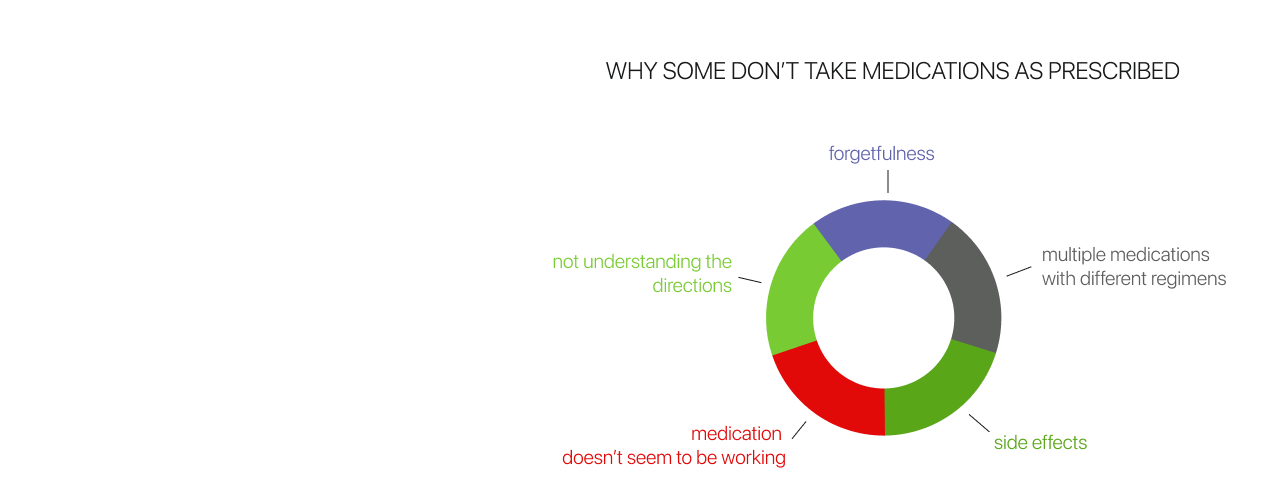
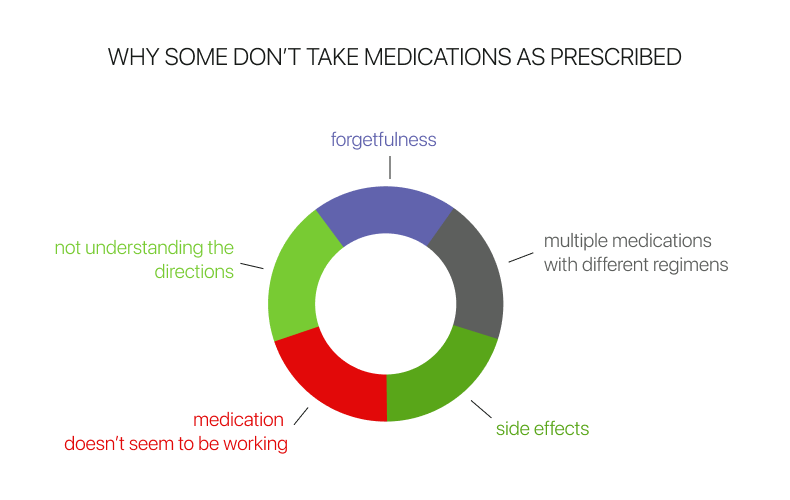
The background of medication therapy management conducted by Mega Aid
In view of the above-mentioned figures and significant problems, representatives of the healthcare sector face a difficult task: How can we influence patient adherence and improve the effectiveness of treatment for the patient?
When patients do not comply with the requirements and sequence of treatment, a “snowball” effect may occur that influences the patient’s health for the worse. One of the worst consequences of health complications are interventions and hospitalization that could have been prevented. In addition, this also contributes to higher healthcare costs and worse outcomes for providers.
Mega Aid Compounding Pharmacy developed its own in-house medication therapy management program a decade ago to combat these issues. The control of patient compliance is key to provide an effective treatment. That’s why Mega Aid introduced its own in-house medication therapy management program.
What is a medication therapy management program, conducted by Mega Aid, and how does it work?
Mega Aid Pharmacy Company has an in-house medication therapy management service in order to make the treatment of our patients more effective and improve the outcomes for patients, which helps drive key performance metrics for healthcare providers who collaborates with us.
Medication therapy management’s purpose can be characterized by three key elements:
Controlling patient adherence
Approximately two weeks after dispensing a compound medication, a dedicated Mega Aid Patient Care Coordinator will call the patient to confirm treatment adherence and a positive outcome. If we understand that the patient is non-compliant with their prescribed treatment, the Patient Care Coordinator educates the patient about proper medication usage.
Measuring the treatment outcomes
A Patient Care Coordinator constantly monitors the patient’s condition, symptoms, and usage of medications and, for many treatments, measures progress or effect of the medication.
Improving the treatment with a healthcare provider
A Pharmacy Liaison reports outcomes to and collaborates with the healthcare provider to continuously improve patient therapy.
We have our own end-to-end software platform, where in addition to compound prescriptions flow, we record all the necessary information about the patient and his or her treatment:
1. Checking the usage of prescribed medications
After receiving the prescribed compounds, our Patient Care Coordinators ask whether the patient has used the medication. We record how many times and in what dosage. If the patient did not take medications or used the medication not according to the prescription – we speak with the patient about usage to improve their literacy about proper medication usage by educating them.
2. Tracking treatment outcomes
During the treatment, we record in our database patients’ outcomes: how the patient’s condition has changed after using the compound medications. In case of side effects or other reactions, we record everything in the database for further formulation improvements with the physician.
3. Overview of currently used medicines
We ask whether the patient currently uses any other medicines. If the answer is ”yes”, then we request to specify which ones, in what doses, and how many times per day. Thereby, we control drug tolerances and compare used medications with disease states in our database.
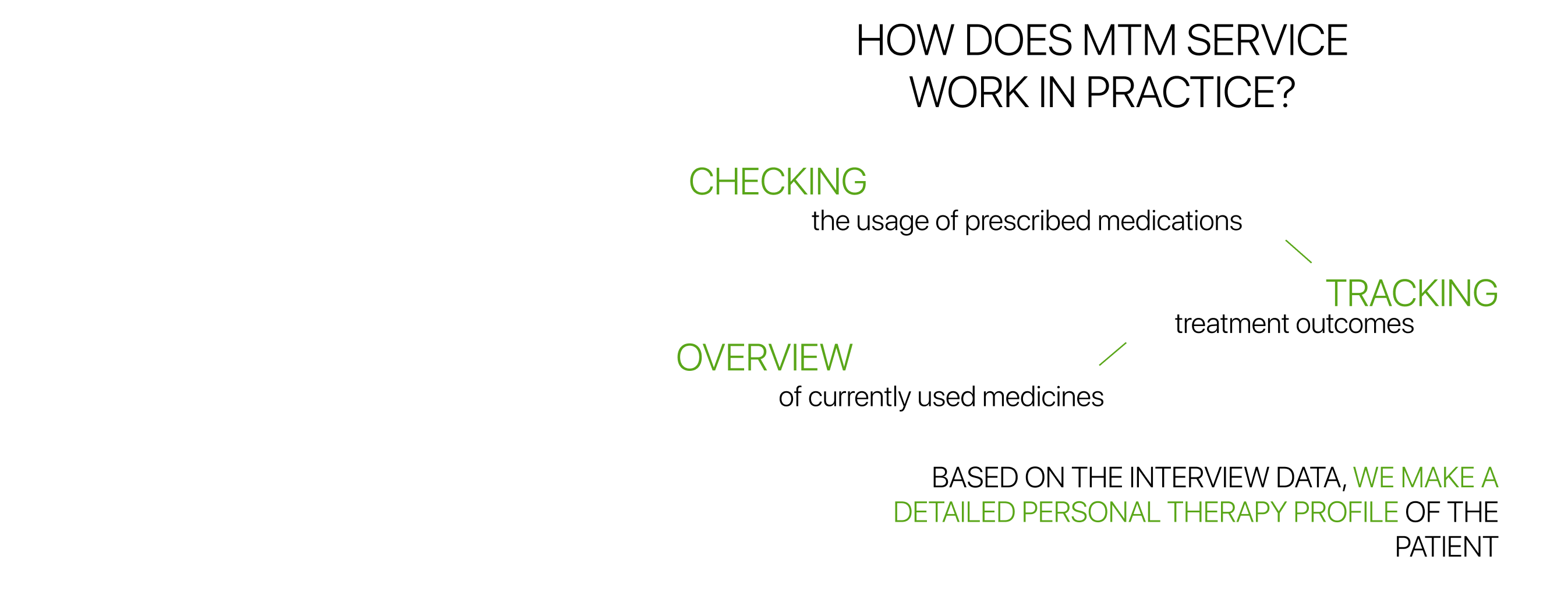
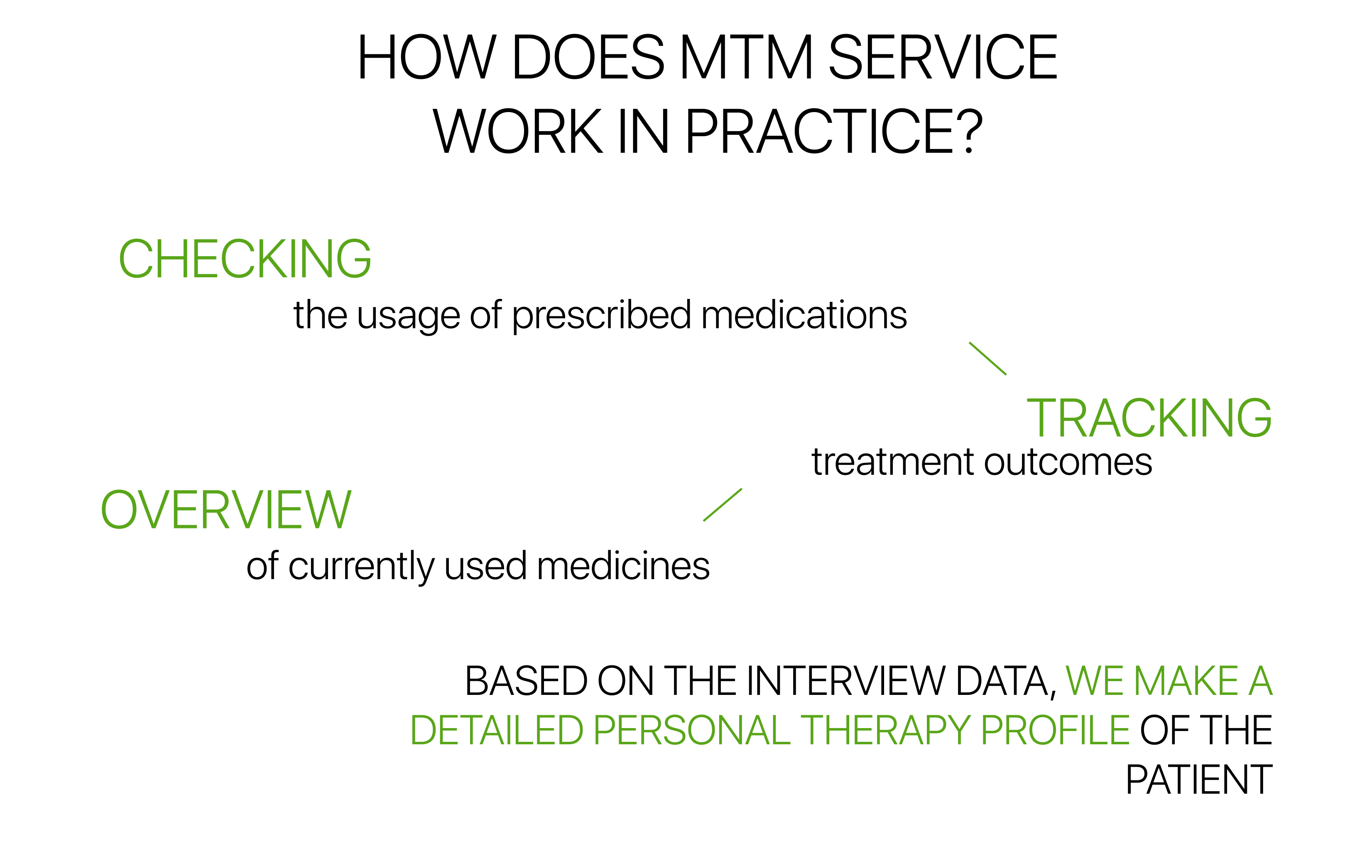
Based on the interview data, we make a detailed personal therapy profile of the patient. We enter all the necessary information into our database that will be important for further treatment improvement.
All this allows us to see the patient’s whole therapeutic picture, taking into account all indicators including allergies, and drug tolerance in interaction with other drugs to avoid side effects and negative consequences. We are always in touch with the patient to improve the treatment plan in collaboration with the healthcare provider.
How medication therapy management helps patients adhere to their treatment
As we mentioned above, there are specific reasons why patients don’t adhere to their prescribed therapy. We want to explain how the medication therapy management program conducted by Mega Aid covers patients’ main reasons of non-compliance.
1. The patient does not understand the directions
90 million adults do not have the appropriate level of health literacy to understand and act on the information that doctors are given. It is difficult to remember all the instructions, a person leaving the office may immediately forget about them and can be embarrassed to ask for the information again or the patient may be mistakenly convinced that he is completing the treatment or application correctly.
The medication therapy management program, conducted by Mega Aid Compounding Pharmacy starts with our specialists clearly explaining how exactly patients should take their medications, and in what doses. With our constant communication and monitoring, patients will receive regular and consistent reinforcement of correct usage and dosing instructions.
2. The patient may forget to take their medicine
The patient can simply forget about our own health and treatment. However, we have a solution to this problem because our Patient Care Coordinators will unobtrusively call and remind the patient about the necessity of using prescribed medications.

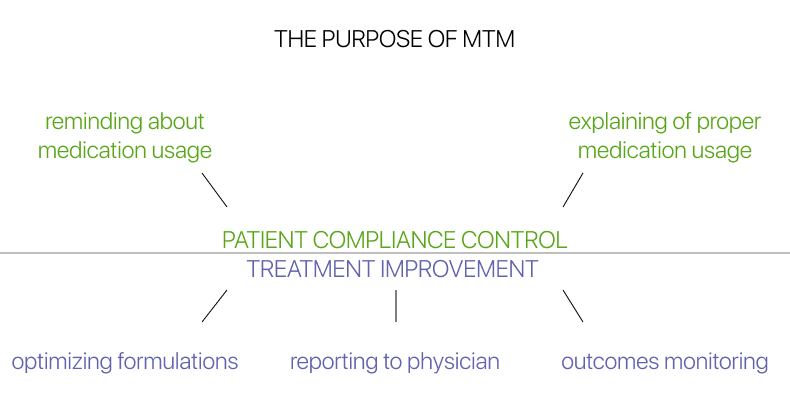
3. The patient can have multiple medications with different regimens
The patient may get confused with the huge number of prescribed medications and the sequence of taking them. This raises another potential issue: the combination of multiple different drugs, which may cause side effects and other reactions that would not occur if each drug were taken on its own.
As for the first, we have already mentioned, our Patient Care Coordinators, are always in touch with patients, and they will be able to explain to them how exactly they should take the medicine, and in what doses. Due to this, we get rid of another problem, because during treatment we interview the patient about his medical history and what medications he or she is currently taking. Therefore, our Pharmacy Liaisons are able to work with the healthcare provider to optimize the formulations and drug regimens so that the patient could reduce their total drug regimen with the same or even greater effect.
4. The patient can have unpleasant side effects
This can happen due to intolerance of prescribed medication or interactions with other prescribed drugs.
Our experienced pharmacists optimize and improve formulations together with the healthcare provider, taking into account other medications that the patient takes. We collect all the information about the patient in order to avoid allergic and adverse reactions in the future, we select an individual treatment that will be the best suitable for patients.
5. Medication doesn’t seem to work on patient
It happens that a patient takes medicines for some time and thinks that it has no benefit. But the fact is that prescribed medicines often have a cumulative effect, and the patient will not be cured in a couple of days.
So our Patient Care Coordinators explain all of such information to the patient and the importance of following all the prescribed treatment guides. In most cases these tips for patients works. But if not, our pharmacists and Pharmacy Liaisons can work with the healthcare provider to improve the formulation of the prescribed compound to achieve more effectiveness of the drug.
How medication therapy management helps healthcare providers improve patient outcomes
Let’s focus on the main problems that may arise in the doctor’s interaction with patients.
First, inconstant communication with the patient.
Often patients do not want to spend time to see a physician with the first new symptoms or side effects that bother them. Also, a physician may not know if the patients take medicines in the wrong way, or just quit using. So often patients reach a medical office when complications already appear and they need an intervention.
However, all of this may be prevented with a medication therapy management program conducted by Mega Aid. As we mentioned before, we conduct this constant communication with the patient, helping prevent negative consequences.
Second, the absence of a full medical picture.
Patients can visit various healthcare providers for treating different diseases. So each provider might not have all the information about all diseases, prescribed medications, and possible side effects. The problem is a lack of tools where all information could be stored and analyzed. After all, the patient may consider it unimportant to tell about a treatment to other physicians or simply forget to mention it.
Mega Aid’s medication therapy management program helps to address this issue. We have a database that includes records on the assessment of the patients’ prescribed drugs, based on our constant communication with the patient, which we can match with specific disease states. Our database also includes medication reviews for identifying and preventing potential problems that may arise during treatment, including allergic/adverse reactions as well as drug interactions.
To sum up, we see the importance of medication therapy management, and what a useful and positive input it entails. Medication therapy management is helpful for healthcare providers and they can be sure that their patients’ supervision is responsibly monitored, preventing further health complications. It is also beneficial for the patients because they can always count on our support, reminders, and tracking of their health. In an unclear situation, the patient can always turn to Mega Aid.

